
Oral History
Browse an alphabetical list of survivors’ oral histories. These interviews describe firsthand accounts and personal experiences during the Holocaust and World War II.
<< Previous | Displaying results 1-10 of 30 for "Oral History" | Next >>
-
Fela Warschau describes liberation by British forces at Bergen-Belsen
Oral HistoryFela was liberated at Bergen-Belsen by the British army in 1945. She went to a displaced persons (DP) camp administered by the Americans in Feldafing, near Munich. She married in the DP camp in 1946, and eventually immigrated to the United States.

-
Fela Warschau describes reading lists of names to find surviving family members
Oral HistoryFela was liberated at Bergen-Belsen by the British army in 1945. She went to a displaced persons (DP) camp administered by the Americans in Feldafing, near Munich. She married in the DP camp in 1946, and eventually immigrated to the United States.
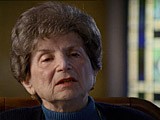
-
Fela Warschau describes the Feldafing displaced persons camp
Oral HistoryFela was liberated at Bergen-Belsen by the British army in 1945. She went to a displaced persons (DP) camp administered by the Americans in Feldafing, near Munich. She married in the DP camp in 1946, and eventually immigrated to the United States.
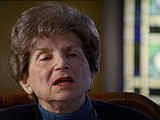
-
Felix Horn describes a hiding place in Warsaw
Oral HistoryFelix was born to an assimilated Jewish family in Lublin, Poland. His father was a locksmith and his mother was a singer. Following the German invasion of Poland on September 1, 1939, Felix fled east to Rovno and then to Soviet-occupied Lvov, where he was accepted at a medical school. After the German invasion of the Soviet Union in June 1941, Felix was taken to a labor camp. He escaped and returned to Lublin, and found that his family had been forced into the ghetto established there. After the…
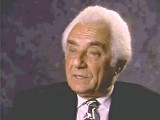
-
Felix Horn describes antisemitism in Lvov and conditions in the Janowska camp
Oral HistoryFelix was born to an assimilated Jewish family in Lublin, Poland. His father was a locksmith and his mother was a singer. Following the German invasion of Poland on September 1, 1939, Felix fled east to Rovno and then to Soviet-occupied Lvov, where he was accepted at a medical school. After the German invasion of the Soviet Union in June 1941, Felix was taken to a labor camp. He escaped and returned to Lublin, and found that his family had been forced into the ghetto established there. After the…
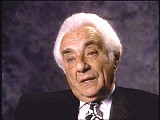
-
Felix Horn describes attempt to flee from the Majdan Tatarski ghetto
Oral HistoryFelix was born to an assimilated Jewish family in Lublin, Poland. His father was a locksmith and his mother was a singer. Following the German invasion of Poland on September 1, 1939, Felix fled east to Rovno and then to Soviet-occupied Lvov, where he was accepted at a medical school. After the German invasion of the Soviet Union in June 1941, Felix was taken to a labor camp. He escaped and returned to Lublin, and found that his family had been forced into the ghetto established there. After the…
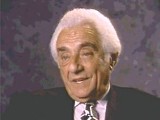
-
Felix Horn describes escaping from the Majdan Tatarski ghetto and seeking shelter
Oral HistoryFelix was born to an assimilated Jewish family in Lublin, Poland. His father was a locksmith and his mother was a singer. Following the German invasion of Poland on September 1, 1939, Felix fled east to Rovno and then to Soviet-occupied Lvov, where he was accepted at a medical school. After the German invasion of the Soviet Union in June 1941, Felix was taken to a labor camp. He escaped and returned to Lublin, and found that his family had been forced into the ghetto established there. After the…
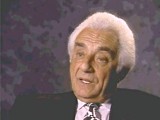
-
Felix Horn describes postwar emigration with the Brihah movement and adjustment to life after the war
Oral HistoryFelix was born to an assimilated Jewish family in Lublin, Poland. His father was a locksmith and his mother was a singer. Following the German invasion of Poland on September 1, 1939, Felix fled east to Rovno and then to Soviet-occupied Lvov, where he was accepted at a medical school. After the German invasion of the Soviet Union in June 1941, Felix was taken to a labor camp. He escaped and returned to Lublin, and found that his family had been forced into the ghetto established there. After the…
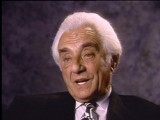
-
Flory (Floritza) Jagoda describes anti-Jewish measures following the occupation of Zagreb
Oral HistoryFlory was born into a Sephardic Jewish family. When Flory was a young girl, her mother moved to Zagreb with Flory's stepfather; Flory joined them after living with her grandmother for two years. In Zagreb, Flory took music lessons and learned how to play the accordion. Germany and its allies invaded Yugoslavia in April 1941, partitioning the country and establishing a fascist regime under the Ustase (pro-German Croatian nationalists) in Croatia. The Ustasa regime soon imposed anti-Jewish regulations in…
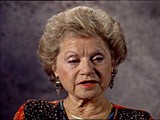
-
Flory (Floritza) Jagoda describes seeking refuge in Italy
Oral HistoryFlory was born into a Sephardic Jewish family. When Flory was a young girl, her mother moved to Zagreb with Flory's stepfather; Flory joined them after living with her grandmother for two years. In Zagreb, Flory took music lessons and learned how to play the accordion. Germany and its allies invaded Yugoslavia in April 1941, partitioning the country and establishing a fascist regime under the Ustase (pro-German Croatian nationalists) in Croatia. The Ustasa regime soon imposed anti-Jewish regulations in…
